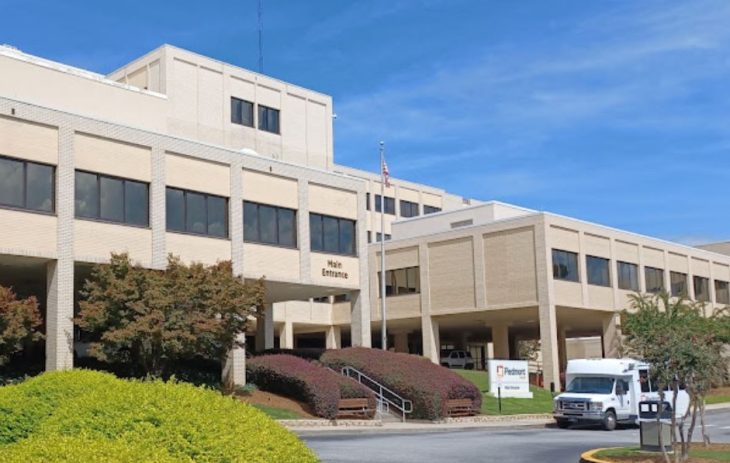About Piedmont Macon Medical Center
For those battling physical drug and alcohol addiction in Macon Georgia, Piedmont Macon Medical Center provides thorough medical detoxification and other addiction treatment services.
They treat people with co-occurring mental illnesses as well as a variety of chemical dependency problems. From the time of your arrival until your release, their staff stresses the value of family participation in the healing process.
Your comfort and stability will be maintained throughout your treatment under the constant supervision of physicians, nurses and support personnel in a secure inpatient hospital environment.
Once you’ve successfully detoxed under inpatient care, a range of classes, group meetings and activities are part of their behavioral health program.
The program aims to educate you about addiction recovery phases, resources and relapse prevention techniques.
They offer a range of outpatient services for patients who are leaving inpatient care or who need less close observation. Through these programs you can get the care you need while still spending each evening with your loved ones. Outpatient programs involve weekly individual sessions with a therapist in addition to group therapy with peers who are going through similar struggles.
Their rigorous group-based program for partial hospitalization places a significant emphasis on recovery through psychoeducation. Those with a dual diagnosis of chemical dependency and behavioral health benefit most from this program. This program fills the gap between inpatient care and community treatment.
Their services include helping you make educated decisions about the next stages of your recovery after discharge. To identify the most effective resources counselors work closely with you. They also offer a free weekly evening aftercare group to help with your ongoing recovery.
You will also have the chance to attend a weekly 12 step meeting while you are an inpatient. Their team will assist you in finding local 12 step meetings to support your ongoing recovery in your community as you get ready to be discharged.
Levels of Care
-
Inpatient
Inpatient and residential programs provide round-the-clock medical and emotional support as you live at the treatment facility. This level of care may be recommended if you have severe addictions or mental health conditions since it removes outside distractions and allows you to focus solely on therapy.
-
Outpatient
In outpatient therapy, you’ll attend therapy sessions several times each week while living at home. This is ideal if you have a strong support system and a lower risk of relapse. Outpatient treatment offers flexibility to maintain work, school or family obligations.
-
Aftercare
Aftercare programs provide ongoing support after you complete a rehab program. They may include several components to help you maintain sobriety including therapy, community support groups and relapse prevention strategies. This gives you a network of resources as you reintegrate into your daily life.
-
Dual Diagnosis
Dual diagnosis programs address substance use disorders and co-occurring mental health conditions simultaneously. This integrated approach to care improves the likelihood of long term recovery and stability by addressing the root causes of addiction.
Detox Service Setting
-
Inpatient Detox
Inpatient detox occurs in a dedicated treatment facility. You’ll live there around the clock and receive intensive medical support and supervision to help manage your withdrawal symptoms. It is suitable for individuals with moderate to severe addictions as it ensures a stable detox environment.
-
Outpatient Detox
Outpatient detox gives you access to medically supervised withdrawal services while still allowing you to live at home. You’ll attend a clinic for treatment and monitoring. This flexible option is suitable for those with mild to moderate withdrawal symptoms who have strong support systems.
Programs
-
Adult (18+)
Adult programs address the substance use and life challenges specific to adults. Therapists can deliver sessions in individual, group and family settings. Services often include job support and life skills training in a structured environment.
-
Alcohol Detox
Alcohol detox programs offer medical support to help individuals withdraw safely from alcohol. Your care team may use medications to ease your symptoms and provide medical monitoring to address complications.
-
Cognitive Behavioral Therapy
Cognitive behavioral therapy focuses on changing harmful thought patterns and behaviors associated with addiction. You’ll learn healthier coping mechanisms by identifying and replacing negative thoughts. This improves your emotional resilience and decreases your relapse potential.
-
EMDR Therapy
EMDR stands for eye movement desensitization and reprocessing therapy. It helps you process traumatic memories that may underlie addiction. You’ll learn how to reduce emotional distress and begin healing from past events. This makes it effective for trauma related addiction causes.
-
Men
Men's programs address substance use while also considering the social pressures, family roles and mental health concerns that are specific to men. You’ll learn healthy coping mechanisms as you build emotional resilience and develop communication skills.
-
Military / Veterans
Military and veteran programs offer specialized support for clients who served in the armed services. Programs focus on reintegration and healing within a structured and supportive environment that acknowledges the unique struggles of military life.
-
Opioid Detox
Opioid detox uses medications to ease severe withdrawal symptoms. It also includes medical supervision to help you manage potential complications. These services allow you to stabilize and begin a recovery plan.
-
Seniors (65+)
Senior programs address the unique needs of older adults like chronic pain, grief and isolation. Programs include peer support and medical oversight for age related health concerns. The goal is to improve quality of life and promote sober aging.
-
Women
Women's programs offer a safe and supportive space to focus on gender specific issues such as trauma, family roles and mental health conditions. Therapists tailor the sessions to address women's needs and foster empowerment in a healing and nurturing environment.
-
Young Adult (18 - 25)
Young adult programs are designed for individuals who are transitioning into adulthood. Topics of discussion typically include identity, independence and peer relationships. Providers may also offer life skills training and career support.
Payment Options
- Medicaid
- Medicare
- Military Insurance
- Private Insurance
- Self Pay
Accreditations
-
 Joint Commission
Joint Commission
Contact
350 Hospital Drive
Macon, GA 31217





